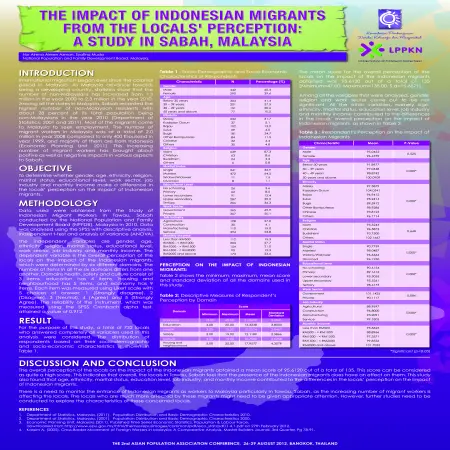Browse by Type
Results for Item type : "Scientific Poster"
Scientific Poster (1)
|
|
The impact of Indonesian migrants from the locals' perception: a study in Sabah, Malaysia
Item Type: Scientific Poster
Editor:
Year: 00/08/2012
Abstract: Being a developed country, Malaysia has been receiving a large number of labour migrants from other neighboring countries. Statistics show that the total number of non-Malaysians in 2010 is 2.3 million compared to 1.3 million in the year 2000. It is over 8 percent of the total population in Malaysia and comprises mostly of Indonesian migrants. This phenomena has a great impact on Malaysia and its people. The objective of this study is to determine the impact of Indonesian migrants from the locals' perception and also to determine if gender, ethnicity, religion, marital status, educational level, job industry and monthly income make a difference in their perception. The data used for this study were obtained from the Study on Indonesian Migrants in Tawau, Sabah conducted by the National Population and Family Development Board (NPFDB) Malaysia in 2010. The survey managed to obtain information from 787 locals in Tawau. The dependent variable is the overall perception of the locals on the impact of the Indonesian migrants while the independent variables are gender, ethnicity, religion, marital status, educational level, job industry and monthly income. Independent t-test and analysis of variances (ANOVA) were applied to the data set. As a result, this study indicates that the locals in Tawau feel that the presence of the Indonesian migrants does have an effect on them. The mean score obtained was 95.053 out of a total of 135. The results of ANOVA showed that ethnicity (F = 6.950, df = 7), marital status (F = 12.320, df = 3), education level (F = 4.058, df = 7), job industry (F = 27.374, df = 3), and monthly income (F = 15.201, df = 6) contributed to the differences in the locals' perception on the impact of Indonesian migrants. Only gender and religion does not affect their perception. Thus, the entrance of Indonesian workers needs to be monitored as their presence are affecting the locals.
|
|
|
|





